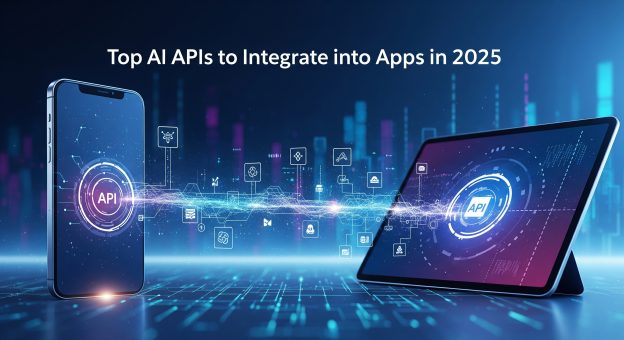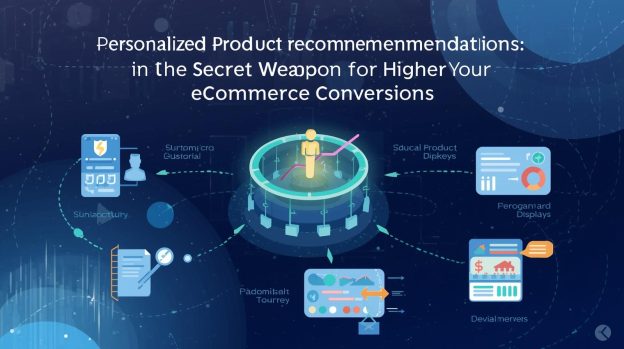Top AI APIs to Integrate into Apps in 2025

The fast-paced technological industry is witnessing the revolution of AI in almost every sector. Whether it’s logistics, supply chain, IT, education, finance, healthcare, or other areas, AI API integration in mobile apps enhances user experience and app efficiency. There is an AI API for various tasks. AI APIs enable demand forecasting, enhance search functionality, generate images, and understand human speech.
AI integration in mobile apps takes its performance to the next level. Mobile apps utilise the existing capabilities of AI APIs, enabling them to deliver exceptional efficiency. In this article, we will discuss the features and capabilities of various AI APIs. Developers can integrate these AI APIs in mobile applications to improve their overall efficiency and consequently improve user experience.
What is an AI API?
Artificial intelligence (AI) application programming interface (API) is a technology through which developers can integrate artificial intelligence features in mobile apps. AI APIs act as bridges through which developers can integrate AI functionalities within various applications. It enables them to perform more complex tasks in an efficient manner, such as spam filtering, facial recognition, sentiment analysis, etc.
In simple words, AI API provides access to pre-trained machine learning models through which mobile apps become even smarter and more intelligent without requiring human input for extensive tasks.
Let’s Look at Some Popular AI APIs to Integrate in Mobile Apps
OpenAI API
Open AI API provides access to the GPT models. GPT model works with natural language processing that enables it to understand human language and generate human-like responses.
Developers can integrate an open AI API into mobile applications to leverage advanced machine learning capabilities. AI API has a simple conversational interface that allows access to different AI capabilities like image processing, image generation, code generation, content writing, ideation and research without the need for deep AI expertise.
Google Cloud AI API
The second API that developers can integrate into mobile applications is the Google Cloud AI API. This API enables various AI capabilities, including natural language AI and vision AI.
Developers will no longer need to build and train the machine learning models from scratch. The key features of the Google Cloud AI API include speech AI, natural language AI, vision AI, generative AI and video AI.
For example, by integrating the Google Cloud AI API, developers can leverage generative AI features which allow interaction with large language models like Gemini for text summary, text generation, code generation and translation. Developers and leverage vision AI for image analysis, including facial recognition, object detection, and extraction.
Azure AI Services API
Azure AI Services API provides access to different AI models and features like speech recognition, natural language processing, decision making, computer vision, etc., through REST APIs and SDKs.
Azure AI Services API offers a collection of AI APIs through which developers can enhance the efficiency of mobile applications. The key features in this API include:
- Vision API provides face recognition, object detection, and image categorisation.
- There is a speech API which is applicable for converting speech to text, recognising speech and supporting multilingual transcription.
- Azure AI Services API also includes a language API, which offers text summarisation, text analysis with sentiment analysis, and translation features.
- The decision API is effective for personalised decision making and anomaly detection.
AWS AI Services
AWS offers a collection of artificial intelligence services through its API, which is accessible to all developers. It provides uses based pricing model having flexible options for enterprise and start-up businesses.
AWS AI services API is best for voice interfaces, content moderation, visual search and personalised AI experiences. The key features in this API include personalised AI models, Polly, Lex, and Rekognition. All of these features provide unique AI capability which improves the overall efficiency of mobile apps.
- Amazon Rekognition provides video and image analysis APIs for tasks like scene and object detection, face recognition, and inappropriate content detection.
- Amazon Polly allows text-to-speech conversion using its APIs through which mobile apps can generate human-like speech from text input.
- Amazon offers APIs to develop interfaces for voice assistance and chatbots using natural language understanding and automatic speech recognition.
Hugging Face API
Hugging Face inference API is a popular AI API among developers. It allows access to the features of NLP models. They are pre-trained to perform tasks like text classification, text generation, text summarisation, and more.
Developers can easily integrate the Hugging Face API to leverage advanced NLP capabilities into the mobile apps. The features of this API include text generation, pre-trained model, text summarisation, text translation and multi-language support. This API can develop powerful applications like chatbots, sentiment analysis, and document summarisation.
Tavus API
Tavus API offers the generation of ultra-realistic videos by processing text input. Tavus API provides AI-powered video synthesis, which can turn text-based scripts into fully fledged, high-quality videos.
Tavus API is one of the top choices for businesses that require scalable video content, which is highly ideal for content creators, digital marketing companies, mobile app development companies, marketing teams and enterprises.
The key features of Tavus API include customisable templates, realistic video generation and AI-generated VoiceOver.
- This API can convert human text into realistic video content.
- This API provides natural-sounding, professional-quality VoiceOver in the generated video.
- There are multiple customisable templates made available by the Tavus API. Users can choose from different backgrounds, video styles, and formats.
To Sum Up
Choosing the right AI API for your mobile app requires developers to define the use case and identify specific issues they want to solve through the API. If the AI features of the API align with your mobile application goals, you can leverage its features to make mobile apps more scalable.
Some AI APIs are best for start-ups, while some may be more suitable for enterprise-level mobile apps. Before proceeding with the integration of the AI API into the mobile app, developers must ensure that the API is suitable for large-scale applications. AI APIs provide ready-to-use models and are pre-trained, which significantly reduces the time and effort required to develop AI-powered machine learning models from scratch. For mobile application development needs, you can consult our developers at VerveLogic, a leading mobile application development company in USA. We provide state-of-the-art mobile app solutions with AI integration to fulfil your organisational goals and improve customer experience.



